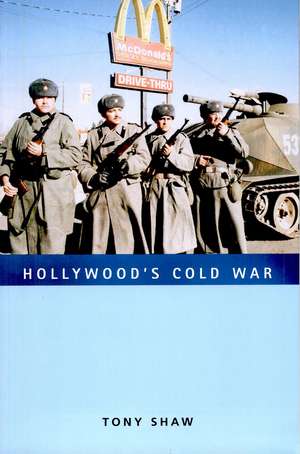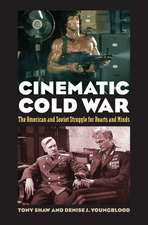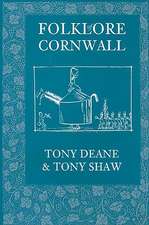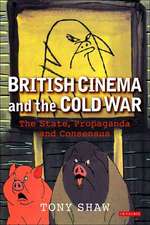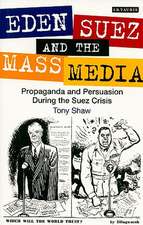Hollywood's Cold War: Culture and Politics in the Cold War and Beyond
Autor Tony Shawen Limba Engleză Paperback – 24 oct 2007
At a moment when American film reflects a deepening preoccupation with the Bush administration's War on Terror, this authoritative and timely book offers the first comprehensive account of Hollywood's propaganda role during the defining ideological conflict of the twentieth century: the Cold War. In an analysis of films dating from America's first Red Scare in the wake of the 1917 Bolshevik Revolution to the collapse of the Berlin Wall in 1989, Tony Shaw examines the complex relationship between filmmakers, censors, politicians, and government propagandists. Movies, Shaw demonstrates, were at the center of the Cold War's battle for hearts and minds. Hollywood's comedies, love stories, musicals, thrillers, documentaries, and science fiction shockers played a critical dual role: on the one hand teaching millions of Americans why communism represented the greatest threat their country had ever faced, and on the other selling America's liberal-capitalist ideas around the globe. Drawing on declassified government documents, studio archives, and filmmakers' private papers, Shaw reveals the different ways in which cinematic propaganda was produced, disseminated, and received by audiences during the Cold War. In the process, he addresses subjects as diverse as women's fashions, McCarthyism, drug smuggling, Christianity, and American cultural diplomacy in India. Anyone seeking to understand wartime propaganda today will find striking contemporary resonance in his conclusions about Hollywood's versatility and power.
| Toate formatele și edițiile | Preț | Express |
|---|---|---|
| Paperback (2) | 216.43 lei 3-5 săpt. | |
| EDINBURGH UNIVERSITY PRESS – 19 sep 2007 | 216.43 lei 3-5 săpt. | |
| University of Massachusetts Press – 24 oct 2007 | 298.22 lei 6-8 săpt. |
Din seria Culture and Politics in the Cold War and Beyond
-
 Preț: 157.05 lei
Preț: 157.05 lei -
 Preț: 246.38 lei
Preț: 246.38 lei -
 Preț: 210.35 lei
Preț: 210.35 lei -
 Preț: 225.56 lei
Preț: 225.56 lei -
 Preț: 224.21 lei
Preț: 224.21 lei -
 Preț: 205.09 lei
Preț: 205.09 lei -
 Preț: 235.15 lei
Preț: 235.15 lei -
 Preț: 260.07 lei
Preț: 260.07 lei -
 Preț: 296.71 lei
Preț: 296.71 lei -
 Preț: 277.16 lei
Preț: 277.16 lei -
 Preț: 300.35 lei
Preț: 300.35 lei -
 Preț: 291.90 lei
Preț: 291.90 lei -
 Preț: 293.04 lei
Preț: 293.04 lei -
 Preț: 296.71 lei
Preț: 296.71 lei -
 Preț: 274.83 lei
Preț: 274.83 lei -
 Preț: 193.29 lei
Preț: 193.29 lei -
 Preț: 224.60 lei
Preț: 224.60 lei -
 Preț: 241.09 lei
Preț: 241.09 lei -
 Preț: 242.06 lei
Preț: 242.06 lei -
 Preț: 216.05 lei
Preț: 216.05 lei - 7%
 Preț: 183.67 lei
Preț: 183.67 lei -
 Preț: 208.59 lei
Preț: 208.59 lei - 15%
 Preț: 564.69 lei
Preț: 564.69 lei -
 Preț: 189.43 lei
Preț: 189.43 lei - 15%
 Preț: 570.07 lei
Preț: 570.07 lei -
 Preț: 215.42 lei
Preț: 215.42 lei -
 Preț: 222.08 lei
Preț: 222.08 lei -
 Preț: 246.55 lei
Preț: 246.55 lei -
 Preț: 250.24 lei
Preț: 250.24 lei
Preț: 298.22 lei
Nou
Puncte Express: 447
Preț estimativ în valută:
57.07€ • 61.97$ • 47.94£
57.07€ • 61.97$ • 47.94£
Carte tipărită la comandă
Livrare economică 22 aprilie-06 mai
Preluare comenzi: 021 569.72.76
Specificații
ISBN-13: 9781558496125
ISBN-10: 1558496122
Pagini: 352
Dimensiuni: 156 x 235 x 23 mm
Greutate: 0.6 kg
Ediția:First Edition
Editura: University of Massachusetts Press
Colecția University of Massachusetts Press
Seria Culture and Politics in the Cold War and Beyond
ISBN-10: 1558496122
Pagini: 352
Dimensiuni: 156 x 235 x 23 mm
Greutate: 0.6 kg
Ediția:First Edition
Editura: University of Massachusetts Press
Colecția University of Massachusetts Press
Seria Culture and Politics in the Cold War and Beyond
Recenzii
"Politically nuanced, historically contextualized, and internationally informed, Hollywood's Cold War is essential reading for anyone interested in this fascinating subject. Tony Shaw's analysis is both penetrating and comprehensive. The broad range of films he studies will greatly expand conventional understandings of the Cold War's impact on American filmmaking."—Christian G. Appy, author of Patriots: The Vietnam War Remembered from All Sides
"This is a complex and rewarding book held together with a coherent argument but not afraid to admit the many-sided possibilities when interpreting cultural products. . . . This is a fine, well-researched work."—H-Net Reviews
"A very broad and inclusive history of the interaction between U.S. films and the Cold War, covering the period from 1917 to 1989. Basing his narrative on extensive research, including archival materials, Shaw is objective and analytical in his approach. He deals with a wide variety of genres: documentaries, government, and Hollywood; the repressive atmosphere of the McCarthy era; the Vietnam War; the struggle for civil rights; and government subsidies. The U.S. position during the Cold War influenced and was influenced by Hollywood films. Presidents of both parties, bureaucrats, and security agencies, and military leaders used film to spread pro-American ideas and images, with mixed success. The book has extensive footnotes and an excellent bibliography. Important for political and cultural history. Highly recommended."—CHOICE
"A sprightly and very informative volume, which analyzes how Communists and their adversaries were shown on the big screen. Shaw also provides an often intriguing backstory in which particular forces and folks make the artifacts of mass culture that help shape perceptions . . . The extent of Shaw's research in official records and studio files, plus comprehensive trolling of the secondary sources, is bound to satisfy the most exacting standards, but in Hollywood's Cold War he wisely opts for case studies rather than synoptic breadth."—Journal of Cold War Studies
"[Shaw] makes a persuasive case. It is abetted by a levelheaded tone, a crisply informative manner, and an approach more concerned with telling a story than grinding an ax."—American Historical Review
"This book makes a significant contribution to the historiography of the Cold War. Shaw makes an excellent case that Cold War was fought culturally, as well as diplomatically, economically, and militarily. . . . It will prove indispensable to anyone considering further research and to those teaching courses on U.S. Cold War cinema."—The Historian
"Shaw meticulously researched book, Hollywood's Cold War, investigates the history of the mainstream American film industry's willing collusion with Washington to produce and disseminate anti-Communist entertainment nationally and internationally, while simultaneously marketing American capitalist ideologies to the world."—Screening the Past
"This is a complex and rewarding book held together with a coherent argument but not afraid to admit the many-sided possibilities when interpreting cultural products. . . . This is a fine, well-researched work."—H-Net Reviews
"A very broad and inclusive history of the interaction between U.S. films and the Cold War, covering the period from 1917 to 1989. Basing his narrative on extensive research, including archival materials, Shaw is objective and analytical in his approach. He deals with a wide variety of genres: documentaries, government, and Hollywood; the repressive atmosphere of the McCarthy era; the Vietnam War; the struggle for civil rights; and government subsidies. The U.S. position during the Cold War influenced and was influenced by Hollywood films. Presidents of both parties, bureaucrats, and security agencies, and military leaders used film to spread pro-American ideas and images, with mixed success. The book has extensive footnotes and an excellent bibliography. Important for political and cultural history. Highly recommended."—CHOICE
"A sprightly and very informative volume, which analyzes how Communists and their adversaries were shown on the big screen. Shaw also provides an often intriguing backstory in which particular forces and folks make the artifacts of mass culture that help shape perceptions . . . The extent of Shaw's research in official records and studio files, plus comprehensive trolling of the secondary sources, is bound to satisfy the most exacting standards, but in Hollywood's Cold War he wisely opts for case studies rather than synoptic breadth."—Journal of Cold War Studies
"[Shaw] makes a persuasive case. It is abetted by a levelheaded tone, a crisply informative manner, and an approach more concerned with telling a story than grinding an ax."—American Historical Review
"This book makes a significant contribution to the historiography of the Cold War. Shaw makes an excellent case that Cold War was fought culturally, as well as diplomatically, economically, and militarily. . . . It will prove indispensable to anyone considering further research and to those teaching courses on U.S. Cold War cinema."—The Historian
"Shaw meticulously researched book, Hollywood's Cold War, investigates the history of the mainstream American film industry's willing collusion with Washington to produce and disseminate anti-Communist entertainment nationally and internationally, while simultaneously marketing American capitalist ideologies to the world."—Screening the Past
Notă biografică
Tony Shaw is reader in international history at the University of Hertfordshire.
